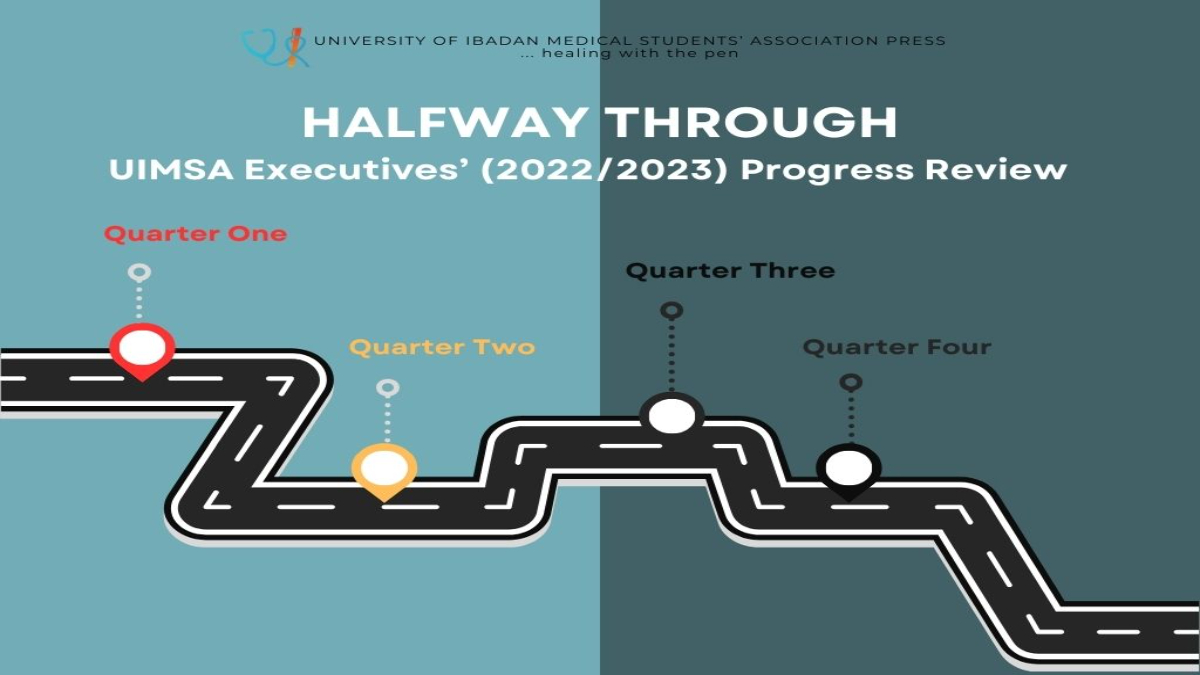On Medical Students and the Dynamics of the Health Ministry in UI

For the umpteenth time, it’s that season of the year when we see numerous posters on notice boards, defacing walls, and e-fliers of students of the University of Ibadan running for different political positions. As the University of Ibadan prepares for another round of hall elections, a peculiar trend has been observed in the halls of residence. This concerns the ‘Ministry of Health’ on campus.
In recent years, even prior, medical and dental students have dominated the positions of health ministers or health commissioners in their respective halls. This goes as far back as the last four sessions in some halls of residence. A cursory glance at past and current officeholders reveals an overwhelming pattern; Independence Hall, Nnamdi Azikiwe Hall, Lord Tedder Hall, Sultan Bello Hall, Kenneth Mellanby Hall, and Queen Idia Hall all feature medical students in these roles, either currently or in the immediate past. Sultan Bello Hall boasts a mix of medical and dental representation, with the immediate past Health Minister being a dental student and the current health minister being a medical student.
However, knowing this is not enough. It’s important to reflect on the reasons for this trend, analyse the performance of these individuals at the helm of Health affairs, and probe what it portends for the quality of leadership we get as students of the University of Ibadan.
Stereotypes and Politics of the position
The persistence of medical and dental students in this office can be attributed to a combination of perception, tradition, and mentorship. Health is a sensitive and essential aspect of hall life, from maintaining hygiene standards to organizing health programs. Students often equate the office with medical expertise, making it easier for candidates from health-related fields to win votes.
David from Ransome Kuti Hall explains, “When a medical student runs for Health Minister, there’s an automatic association of competence. It’s not that other students can’t do the job, but people feel more comfortable with someone who is studying health.” “Medical students are seen as the custodians of health,” says Charles, a 2nd year medical student from Bello Hall. “It’s like asking an engineer to manage a construction project. It just makes sense to most people.”
As more medical students hold the position and perform well, or otherwise, they set a precedent that shapes voter expectations. This cycle explains why the trend continues. It’s not so difficult to see why the cycle is maintained regardless. At the University of Ibadan, student politics appears fixed in terms of progression. The institutions are unchanging. Electorates are far removed from the politicking process. Students appear comfortable with tradition; and unwilling to confront the cycle of leadership in any form.
Of course, being a Health Minister is no walk in the park. Their responsibilities are multifaceted. They include overseeing the cleanliness of the hall, holding health-related programs, liaising with the university’s health services, and addressing health-related emergencies. In essence, the role requires managerial, diplomatic, and crisis-management skills.
It’s in consideration of these, perhaps, that many have doubts about the ability of medical students to perform in these roles, equally considering the demanding nature of ‘the study of Medicine’. A persistent stereotype is that their [medical and dental students] rigorous academic workload would render them too busy or unavailable to perform effectively. “There’s this common saying that medical students are busy students and won’t be available,” admits Babatunde ‘Babzy Jay’ Dauda, the immediate past Health Minister of Ransome Kuti Hall. “This affected my campaign as the opposition sold this ignorance to the electorates. However, I was able to convince them and debunk this myth”. His tenure, a relative success based on conversations with residents of the hall, ultimately became a testament to the fact that medical students, despite their tight schedules, can excel in leadership roles if they possess the right skills and dedication.
Mentorship plays a key role in the sustainability of this tradition. “I had a mentor, Ebuka Asogwa, who guided me” says Abel Adelola, a 4th year Dental student and the immediate past health minister of Sultan Bello Hall. “He was my predecessor and I worked under him as a member of the health committee. While I was health minister, I still ran to him whenever I had questions”. This could be attributed to as one of the reasons for the relative success of his tenure which Bello Press described as highlighted by a ‘proactive approach to health management and the commitment to communication’.
Elizabeth, the current health minister of Queen Idia hall also mentioned that while she didn’t have a direct mentor, she had role models like Babzy Jay and Doctor Park who were health ministers of Kuti and Indy Hall respectively as at the time she decided to contest for the position.
How Well Do They Perform?
A review of the past health ministers in the various halls of residence reveals a mix of competence and dedication, and also clear underperformance. Medical and dental students, in particular, have demonstrated strong leadership by addressing health-related challenges in innovative ways, contributing significantly to the well-being of their hall residents. Similarly, a number have made promises without executing all the way through. The varying levels of commitment and execution highlight the diversity of experiences across halls.
For instance, the aforementioned immediate past Health Minister of Ransome Kuti Hall, Babatunde Dauda, stands out as a positive. His initiatives, such as the No-Food-Waste Recycle Program in partnership with BCCC Africa and the University of Ibadan, proved to be impactful. Additionally, he spearheaded regular water tank washing and Basic Life Support skills training for hall residents, and revived the hall’s first aid boxes—ensuring accessibility and utility. These efforts significantly improved the health sector of Ransome Kuti Hall and set a high standard for others to follow.
Similarly, Elizabeth Ayegboyin, the current Health Minister of Queen Idia Hall and a medical student, has distinguished herself with several initiatives but remains at the centre of some controversies. She pledged to ensure access to first aid care by equipping first aid boxes and training floor representatives in collaboration with the Red Cross. While the floor representatives confirmed they received first aid training, delays in securing funds have hindered the equipping of the first aid boxes, leaving current hall residents unable to fully benefit from this initiative. However, Elizabeth mitigated this shortfall by using her first aid box to meet emergencies.
According to Idia Press, her manifesto emphasized improving environmental cleanliness and health standards. While Elizabeth reported successes, such as two tank-washing exercises and partnerships for sanitation projects, her initiatives have faced criticism. For example, the Keep Idia Clean program, reportedly executed in collaboration with an external organization, lacked the involvement of the health committee. This raised questions about her leadership, particularly as some believed she took undue credit for the program’s execution. Moreover, her plan to introduce monthly sanitation days remains unfulfilled, mirroring the challenges of maintaining cleanliness in Queen Idia Hall.
Nevertheless, Elizabeth excelled in organizing health outreaches, such as programs on sickle cell anemia and World AIDS Day awareness. Additionally, her feedback mechanism, developed with floor representatives, successfully provided a platform for Idiates to communicate their grievances, especially regarding hall sanitation. Despite her efforts, the overall state of Queen Idia Hall’s health sector remains plagued by structural and administrative challenges, leaving room for improvement.
Elizabeth’s tenure stands as an improvement on that of her predecessor, Nwuta Chidinma, who is also a medical student. A review of Chidinma’s performance as health minister by Idia Press reveals that her tenure was marred by unfulfilled promises and a perceived lack of engagement. Despite pledging to organize two sexual health programs and mental health initiatives in collaboration with prominent organizations, none of these materialized. A notable example of her absence in leadership was her refusal to collaborate with Esther, a fellow medical student, on a health program. Esther ultimately conducted the program independently with minimal impact.
While Chidinma introduced a Fitness Day initiative, it occurred only once and faded due to poor turnout and a lack of follow-up. Furthermore, her promise to provide consistent content on sexual and mental health was never realized, leaving a void in the health sector of the hall. These shortcomings reflect a pattern of inaction that undermined her administration.
In comparison, Elizabeth’s tenure, while imperfect, has achieved tangible outcomes, including the execution of first aid training, multiple health awareness programs, and the implementation of a feedback mechanism. Her initiatives have provided a more proactive approach to health-related challenges in Queen Idia Hall. However, her leadership remains a work in progress, with lessons to be learned and areas to be improved.
A review by IndyPress lauds Salako Olajire (Dr. Park) for his proactive approach as Health Commissioner for the 2022/2023 session. His tenure was characterized by regular tank cleaning, general hall sanitation, and cafeteria inspections to ensure hygiene standards. Dr. Park organized first aid training in collaboration with the UI Red Cross, conducted health outreaches on Hepatitis B and HIV, and ensured the availability of free condoms through partnerships with health organizations.
However, some promises remained partially fulfilled. For instance, while sanitation exercises and the establishment of a volunteer squad improved cleanliness, there was no consistent schedule for disinfection of bathrooms and toilets. Additionally, his commitment to bi-weekly health tips fell off mid-tenure due to the committee’s busy schedule. Despite these shortcomings, Dr. Park’s tenure stands out for its dedication to hall health and safety, earning commendation from the press and hall residents alike.
In sharp contrast to these achievements, Ajiboye Elisha’s time as Health Minister of Nnamdi Azikiwe Hall is a clear example of what happens when leadership falls short. According to a review by Zik Press, Elisha’s administration was marred by unfulfilled promises and poor execution. Despite promising to refurbish the hall’s first aid box and ensure its availability during emergencies, Zikites often lacked access to this resource. His plans for mental health awareness and regular tank washing were sporadic at best, and his manifesto commitments, such as organizing monthly health reports and feedback channels, were largely unfulfilled. The most glaring failure during Elisha’s administration was his neglect of critical health hazards. A stagnant sewage waterlog near Zik Hall’s second gate went unattended until a freshman took matters into his own hands. Such neglect highlights the consequences of ineffective leadership in a role critical to hall residents’ well-being.
These are just some of the more recent examples, showing that the quality of performance in this sector is less about the department of emergence and more about the character of the elected.
The Broader Politics of the University
The politics of health ministers in the University of Ibadan’s halls of residence is a microcosm of the larger political atmosphere of the university. While medical and dental students have excelled in these roles, it is essential to examine if their dominance serves the broader student community. It’s not enough to hold on to stereotypes when making decisions at the polls, assuming that these would be sufficient in electing decision-makers. After all, in times of emergency, no one bothers if the Health Minister is a medical or dental student. All they would want to know is if said individual can alleviate the situation on ground.
As the University of Ibadan gears up for another round of hall elections, the spotlight on the politics of Health Ministers offers a valuable opportunity for reflection. The dominance of medical and dental students in this office speaks volumes about the trust placed in their perceived expertise, their ability to deliver on expectations, and the mentorship structures that sustain this trend. If this tradition must be sustained, it is important that the next set of leaders pay attention to the needs of students. This will be reflected in the quality of their campaigns, before anything else. Students must pay attention to issue-based manifestos and quality of stewardship in other positions, among others. And competence, not departmental affiliation, must be the watchword.
Oluwagbolade Ajiboro



